Final Fantasy XI: European Adventure
As a European launch for Square Enix' epic massively multiplayer game looms large (finally!), Rob drops back into Vana'diel and decides he likes what they've done with the place.
"Christ! It's just like The Shining!"
Stanley Kubrick's classic horror film is not, admittedly, the first association that might come to mind when you think about Square Enix' first foray into the massively-multiplayer realms, Final Fantasy XI. However, as journalists from around the (real) world gathered in a dank dungeon in the fantasy world of Vana'diel to experience some of the new features of the game ahead of its European launch next month, you could see where the unlikely exclamation was coming from.
Materialising from nowhere directly in front of the surprised player were two Tarutaru - "scary little midget chaps," to use the technical term - both red mages, both identically suited and booted, and both sporting exceptionally silly hats and equally silly cheerful grins. A comparison with Tweedle Dee and Tweedle Dum might have been more appropriate, but there's no doubt that there was something sinister and Kubrickian about the whole thing.
Game journalists let loose with high-level characters don't stay creeped out for long, though. "Hey, we've got fireworks!" Indeed we did; each player given a nice attractive firework in their inventory, from the recently introduced range of exceptionally spangly special effects which have been added to the game. Evil grins spread around the table; the Taru twins were surrounded, a countdown held, and a sackful of fireworks tossed on the unfortunate pint-sized heroes while our noble adventurers ran away to giggle in a corner like naughty schoolboys.
It's the small things in life. And that's before anyone else realised that they could take their clothes off by clearing out the equipment screen...
Good Things Come
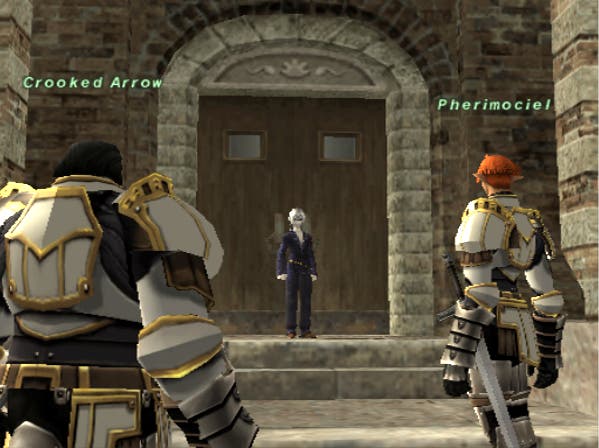
Final Fantasy XI is a bit of an online phenomenon. Although it's debateable whether it has topped EverQuest in terms of user numbers, Square Enix certainly has one of the most popular paid-for online RPGs in the world, with more than 500,000 active paying subscribers running a total of over 1.2 million in-game characters. That's more than half a million copies of the game sold, and over six million dollars a month pouring into the Square Enix kitty from subscribers - a success in anyone's books, especially given that the game is still relatively new in the USA, and won't arrive in Europe until September.
It didn't always look like it was going to be this way. In fact, when Final Fantasy XI launched in Japan just over two years ago, the general consensus seemed to be that it sucked. There wasn't enough content, it was buggy, and the whole affair appeared to be an unfortunate hiccough for the much-loved Final Fantasy series that we'd probably all try to forget. A launch outside Japan for the game, which was originally for the hard-drive equipped PS2 only and relied on Square's proprietary PlayOnline PS2 gaming service (which admittedly to this day remains one of the best console online services ever made), looked distinctly unlikely. In the wake of the not-so-successful Final Fantasy: The Spirits Within, it looked like Square had dropped the ball with its best-loved property once more.
Not so. The company went hard to work at knocking the rough edges off FFXI, and added new content to the game at a rate of knots - from new enemies, items and quests through to entirely new zones or visual effects. "I remember logging in one day and discovering that they'd added rain," one Japanese player told me some time ago. "Loads of players just stood outside and waited for the weather to get bad so we could see what it looked like." In a game as graphically gorgeous as Final Fantasy XI, that's kind of understandable; but adding such large-scale features shows how much effort Square was prepared to put in to get this game right.
Those Who Wait
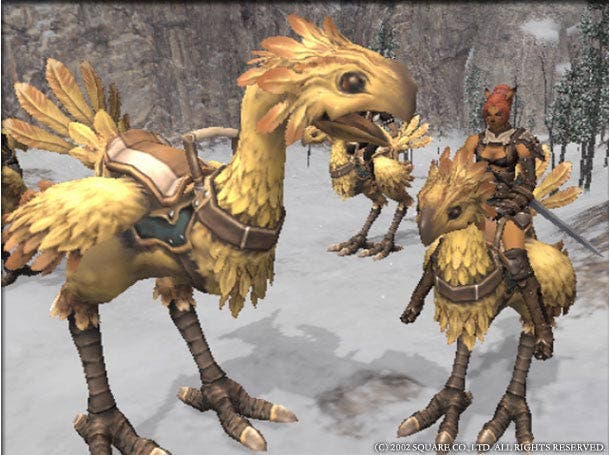
This process of ongoing improvement leads to a somewhat unusual situation for European gamers. We're quite used to waiting for a long time for games to wind their way from Japan, via the United States, to an eventual European release (maybe, if we're lucky); but in this special case, it may well be that we're actually lucky to be jumping on the FFXI wagon so late. The game that will launch in Europe in mid-September will be a very different beast to the Japanese original launch; with over two years of continuous evolution and improvement behind it, this is a polished, mature game with a finely tuned balance, solid player economy model and its teething troubles far behind it - a rare thing indeed in a massively multiplayer game.
What's more, Square Enix is planning to reward European gamers for their patience with an extra freebie in the box. Just as the American launch of the title bundled the Vision of Ziraat expansion pack, which had been sold separately to Japanese consumers, so the European version of the game will include Chains of Promathia, a forthcoming expansion which US and Japanese consumers will have to fork out for separately. Think of it as a little apology for taking so long to release the damn thing over here.
Admittedly, for new players, Chains of Promathia probably won't make a huge difference - just as Vision of Ziraat wasn't exactly great shakes for anyone starting off new on the US version of the game. Although expansion packs for FFXI do add some new content to low- to mid-range level areas, the bulk of new content for players still in the early stages of the game comes from the regular themed events and content updates which are applied to the game through free patches. Expansion packs are more designed to add new high-level areas and additional content for people already at over level 70 - but having them, of course, doesn't hurt, and it's all about creating a more extensive and varied game world. Which is nice.
High Level Negotiations
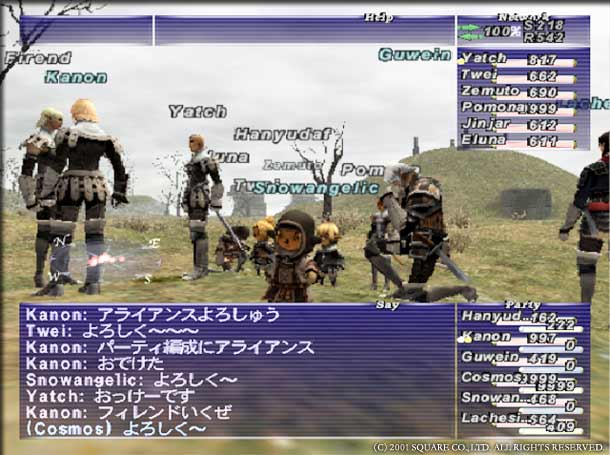
We've already talked at quite exceptional length about the experience of getting started in Final Fantasy XI, so if you're new to MMORPGs or just interested in the low-level areas of the game (from the point of view of a self-confessed "noob"), you should go and read that article, as little will differ in the European version of the game. You'll still play on the same worldwide servers, it's just that now there'll be more nice Europeans on in the same timeframe as you, which will make things better all round, hopefully.
What we can talk about in a bit more depth this time around is the high level areas of the game. "Life begins at seventy-five!" a somewhat heavily addicted FFXI addict friend cheerfully informed me this weekend. Admittedly, his chocobo obsession has cost him his girlfriend and job, but to some degree at least, he does have a point even if he is an utter sadcase. While Square Enix has done a sterling job of providing variety and entertaining content the whole way through the game, it does change radically when you hit levels above 70. With the focus no longer on gaining experience, and perhaps more importantly, with a large group of friends in the game that you've known for a few months, you'll suddenly find that there are a whole range of new challenges and quite radically different gameplay awaiting you.
Admittedly, our lowly characters aren't quite at the point where we can experience this without a helping hand (since, frankly, we're quite keen on keeping our jobs, staying in relationships where possible, and remembering to eat, sleep and wash). However, as previously mentioned, Square Enix helpfully provided us with level 70-odd characters for a few hours, and a whirlwind tour around some of the high level features of the game - which was quite enough to get us salivating over the prospects that await us at the end of our (still very enjoyable) levelling up period.
The Minibosses
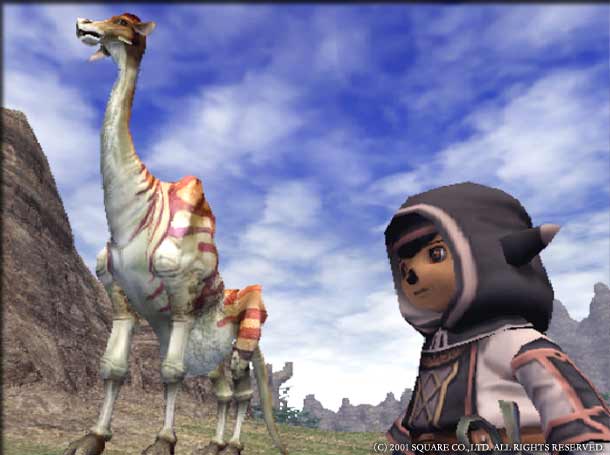
The first thing we were shown in the game was a set of Avatar Battles - epic fights against huge boss creatures that require a full party of very high level characters to complete. Final Fantasy fans will recognise these bosses with glee; most of them are the Summon creatures from the FF console titles, and indeed, the major point of these battles is that players using the Summoner class can call upon the Avatars in battle once they've defeated them in these battles. Fighting alongside a Summoner is a bloody impressive experience - there's nothing quite like standing beside a creature bashing it with your sword only to realise that the chap standing next to you pounding it into dust with his mighty fists is (a) on fire, (b) enormous, and (c) Ifrit.
Like the Dragon boss fight which takes place relatively early in the game (around level 20), fighting against Avatars transports you and your party into a distinct battle ground away from the rest of the zone, so you don't have to wait around for the creature to spawn or anything like that - just touch the appropriate crystal and away you go. The battles themselves are very impressive affairs, throwing around special effects and powerful attacks with wild abandon - and as you might expect, a certain level of tactical play is required to win without having most of your party wiped out. By this stage in the game, most players will be expected to know their roles in a battle exceptionally well, and Avatar Battles are a great way to test those roles and your characters - which is actually a remarkably satisfying element of playing the game.
After delivering a sound thrashing to the likes of Titan and Fenrir, our party of level-70s-for-the-day was slavering for some slightly more competitive sport - so we were introduced to one of the newest additions to Final Fantasy XI, namely the player versus player "sport", Ballista. FFXI players had been clamouring for some form of PVP mode for some time - the game does, after all, have three huge nations to which players ally themselves, so battles between players make sense in that context. However, rather than allowing simple arena combat between players, or border skirmishes between nations, Square Enix chose a different path entirely - creating a new sport which is played between the nations, and which is apparently the first of several PvP features that will appear in the coming months.
Ballista is an exceptionally simple concept. It's open only to high-level players, and the objective is to get together a large team of your countrymen in one zone, who then face off against each other and the game begins. A large number of point-scoring items are buried around the zone, which you can search for by standing over a spot and using a special command; once you're in possession of one of those items, you make a run for a "Rook", which is a type of castle that acts as the goalposts for the game, and score by tossing the item into it.
However, it's all complicated by the fact that other players can engage you in combat to stop you from scoring - and you can't actually score unless you've previously defeated an enemy player in combat, or been part of a group who defeated an enemy player. As such, it's fairly direct one-on-one combat, and like much of the rest of the game, teamplay is vital. You won't get far without a decent range of classes working together to defeat the enemy team - but there's no experience penalty for being killed, and the whole thing is designed as a fun distraction rather than as something to be taken incredibly seriously. It's a great addition to the game, and something to look forward to when you get to level 60 - it'll be interesting to see what Square Enix choose to add next in terms of PvP systems.
Kiss the Bride
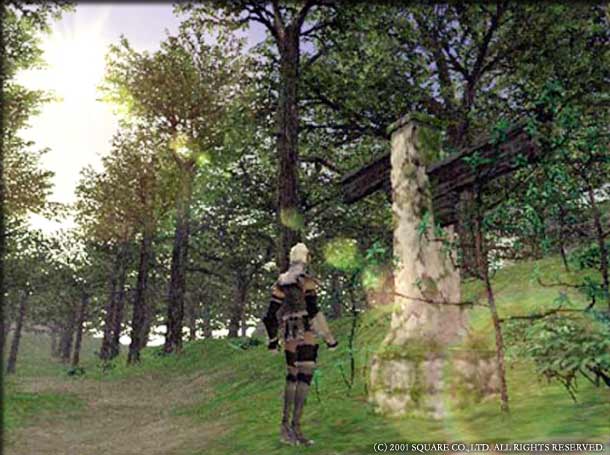
After several hours of running around slaying avatars and battering each other about in the online equivalent of a contact sport (except that most of the contact involved knives and swords), we'd barely scratched the surface of what FFXI has to offer at high levels. Our compatriots over in the USA were about to head off to witness a wedding, but as night settled over London, it was time for us to wind our weary way... What? Yes, yes, I did just say "wedding". Final Fantasy XI recently added the ability for characters in the game to get married, and there's even a special Wedding Dress class of armour for that special day. I know what you're thinking, and it's probably the same as what I'm thinking, but hey; if it allows my now-single FFXI obsessed buddy to bring light back into his life by marrying a Tarutaru husband, who am I to stand in the way of their happiness?
Of course, there's plenty of other stuff happening at high level that we haven't had a chance to touch upon. Square Enix adds bucketloads of new quests to the game every time it's updated, and Chains of Promathia promises to add a massive new chapter to the plot of the game - which, unlikely many MMORPG titles, is actually a very major part of the gameplay, with cutscenes, NPC character development and major plot missions to fulfil. Promathia looks set to open up a whole new set of areas, including the remnants of a once-proud nation destroyed in the last great war - while new dangers encroach on the world of Vana'diel in the form of the "Emptiness", a phenomenon that chews up familiar zones and appears to spawn a host of new and bizarre looking enemies.
All of which, along with the massively healthy subscriber numbers, suggests that Final Fantasy XI isn't going to get boring any time soon - and the onslaught of Europeans who will pitch up in the game in September should help matters, too. Unfortunately, though, it'll be quite tough to actually talk to them, as Square Enix doesn't currently plan to extend the automatic translation system - which translates between Japanese and English at present - to any European languages, although this functionality might be added in a later patch.
European gamers should also note that we're probably going to have to make two with the PC version of the game only, as Sony is still showing no signs of releasing the PS2 hard drive in this territory. It's no big loss, though, to be honest; the PC version of the game isn't a huge system hog by modern standards, and it's a far nicer looking and more functional version. Although an impressive achievement in its own right, the PS2 version is low-resolution and ugly by comparison, and the keyboard is a fairly essential addition to the control scheme.
Plenty of Eurogamer readers took the plunge in Vana'diel a few months back when the game launched in the United States. As an even more polished and comprehensive version of the game washes up on European shores this September, perhaps it's time for the rest of you to think about getting your chocobo on?
Final Fantasy XI is due out on the PC in Europe this September 17th.

